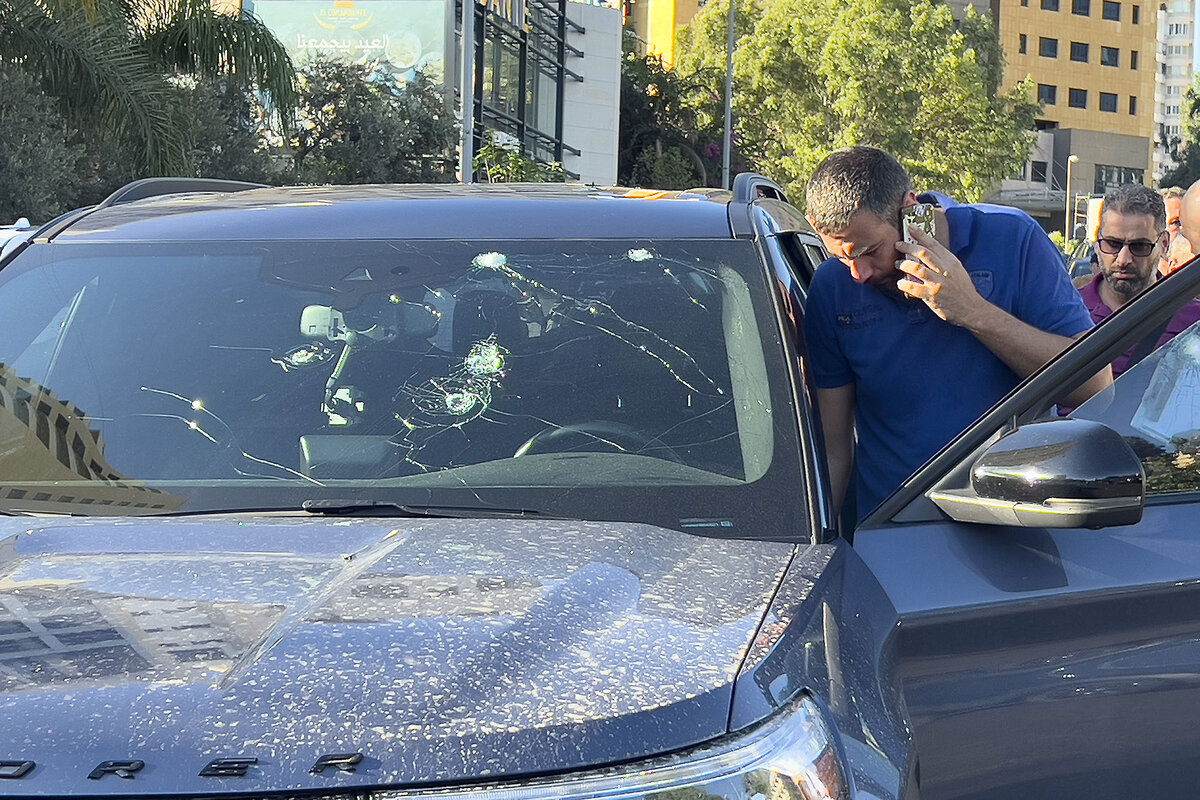What the pager attack in Lebanon means for Israel-Hezbollah conflict
Loading...
| Tel Aviv, Israel
As news broke Tuesday that pagers belonging to Hezbollah members were exploding across Beirut and southern Lebanon, injuring nearly 3,000 people, Israeli TV drama writer Avi Issacharoff turned to the social media platform X.
The co-creator of the hit TV series “Fauda,” about undercover Israeli operatives, posted that writers were working on another season, but “Nothing comes close to what’s currently happening in real life.”
Hezbollah has blamed Israel for the audacious, technically impressive attack, unprecedented in its scope, impact, and complexity.
Why We Wrote This
In Lebanon, exploding pagers and booby-trapped walkie-talkies – believed to be set off by Israel – have rattled Hezbollah and captured the world’s attention. What do they portend?
But the question exercising people on both sides of the Israel-Lebanon border is much simpler: What might come next? Heightened tensions, spiraling retaliation, a wider war?
The first indication that Tuesday’s operation was more than a one-off move came Wednesday afternoon, when another set of low-tech wireless devices, among them walkie-talkies, exploded in Lebanon, reportedly injuring over 100 people and killing nine.
“If this is the beginning of a series of moves, you could say it was done to prepare for a larger offensive” against Hezbollah by destroying one of its communications networks, suggests Yaakov Katz, a senior fellow at The Jewish People Policy Institute, a Jerusalem think tank, and author of “The Weapon Wizards: How Israel Became a High-Tech Military Superpower.”
If the goal is more limited, he argues, “You need to ask what it achieves. And what it potentially achieves is that it shows Hezbollah is vulnerable and weak, and hopefully it boosts deterrence” against retaliation.
For the past 11 months, villages and towns along Israel’s northern border with Lebanon have been under near constant Hezbollah rocket and drone attacks, launched on the heels of Hamas’ Oct. 7 assault on Israel. Forests are ablaze, and almost 70,000 residents of the north, evacuated to safer places, have been unable to go home. Pressure for their return is mounting, fueling advocates of an invasion of Lebanon to push Hezbollah forces back.
At the same time, Israeli airstrikes on Hezbollah positions in southern Lebanon are making life impossible for civilian residents. But to date, both sides have managed an uneasy equilibrium of tit-for-tat warfare, each wary of full-scale war that could prompt a catastrophic level of devastation.
Tuesday’s and Wednesday’s events not only are a “symbolic blow” to Hezbollah, a radical Shiite Muslim organization backed by Iran, said Peter Harling, a former analyst with the International Crisis Group, in a post on X. They also exposed vulnerabilities in what was thought to be the group’s “efficacy, and an almost airtight community,” he wrote.
“Such a moment of destabilization is not one in which Hezbollah is likely to escalate the war. You don’t raise the stakes when your communications are disrupted and your ranks disoriented,” he argued. “For Israel, however, this in principle is the best timing to broaden its scope.”
Israeli Defense Minister Yoav Gallant indicated on Wednesday that Israel’s military focus is shifting north from Gaza, as negotiations for a cease-fire deal to release over 100 hostages appear to have stalled.
“The center of gravity is moving northward – resources and forces are being allocated” to the northern front, he said. “We are at the start of a new phase in the war – it requires courage, determination, and perseverance on our part.”
A division of the Israeli army has been withdrawn from Gaza and redeployed in the north, Israeli media reported Wednesday. On Monday evening, the Israeli Cabinet made the return home of displaced citizens an official war goal.
But some observers remain skeptical about Israel’s intentions.
“What would Israel do in a broader war with Lebanon?” wonders Eyal Zisser, vice rector of Tel Aviv University. “The government does not know what to do about Gaza. Does one give them credit that they will know what to do with Lebanon?”
“If you are thinking about escalating, you need a purpose, a political goal, and [the government’s] goal is to survive politically,” he says.
“It’s highly impressive, what happened” in Lebanon, he acknowledges. “But it is not how you win a war.”







